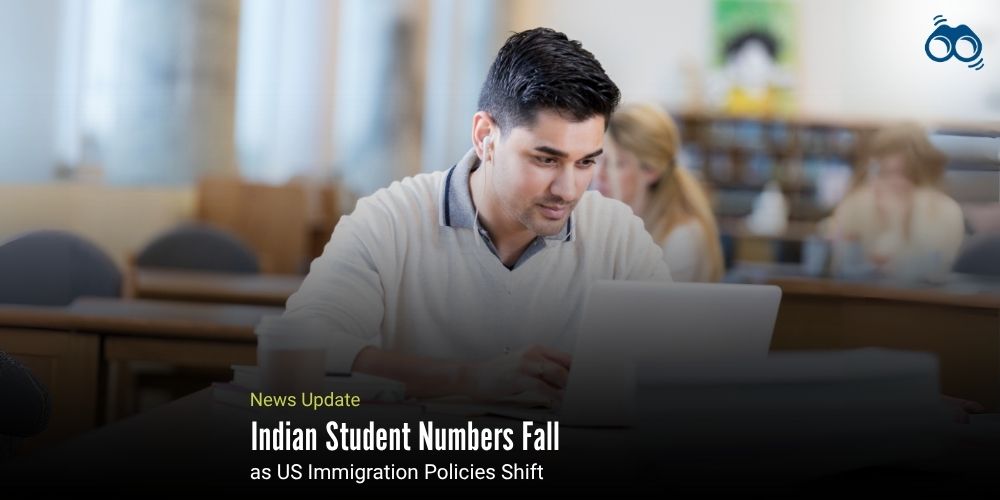Visa Restrictions and Uncertainty Shape International Student Mobility
US Immigration Policies in Flux: Indian Enrolments Decline Sharply
Former US President Donald Trump has reportedly expressed support for hosting international students in the United States, marking a shift from his administration’s earlier stance on foreign enrolments. Speaking from the Oval Office, he emphasised the importance of welcoming students while underscoring the necessity of thorough vetting procedures. His remarks referenced existing visa restrictions on Chinese students, a policy area that had previously drawn scrutiny. During his re-election campaign in June the previous year, he had similarly proposed granting automatic green cards to international graduates of US colleges to retain top global talent.
In a June 2024 podcast, Trump reportedly voiced concerns about losing skilled graduates from institutions such as Harvard and MIT, suggesting that measures should be taken to retain them. He had pledged immediate policy changes upon assuming office; however, his administration did not fulfil this promise. Instead, upon returning to power, it reportedly implemented stricter regulations, including suspending visa interviews and restricting student entries. These actions have drawn criticism from universities and have resulted in legal challenges.
Reports indicate that a proclamation signed on 4 June sought to bar most foreign nationals from attending Harvard, but a federal judge blocked the order the next day, leaving its implications uncertain. Last month, Trump reportedly proposed capping foreign student admissions at 15%, raising concerns amid ongoing visa restrictions. Despite uncertainty surrounding policy shifts, Indian education consultants maintain that the US remains an attractive destination for students, with some stakeholders cautiously optimistic about Trump’s latest remarks.
Akshay Chaturvedi, founder and CEO of Leverage Edu, reportedly urged students to remain focused on their academics rather than be discouraged by shifting policies. In a post on X, he emphasised the importance of hard work and fully utilising study opportunities in the US. He acknowledged free speech but pointed out that political agendas shape governance globally, suggesting that if the US limits public protests, other nations may follow suit. He further noted that every country prioritises its interests within a broader policy framework.
Rahul Subramaniam, co-founder of Athena Education, reportedly stressed that Indian students are vital to the academic and financial stability of many US public universities. He described the current challenges as temporary rather than a fundamental policy shift. He also pointed to green card proposals for top graduates as evidence that efforts to retain global talent remain ongoing. Meanwhile, Abhijit Zaveri, founder and director of Career Mosaic, reportedly commented that most high-profile deportation cases stem from visa violations, including illegal entry, unauthorised employment, or participation in politically sensitive protests. He emphasised that law-abiding F-1 visa holders are generally unaffected, despite rising concerns.
Data from US Immigration and Customs Enforcement (ICE) indicates a notable decline in Indian student enrolments. In 2024, India accounted for nearly 27% of the international student population, making it the largest source of foreign students in the US. However, more recent figures suggest a reversal, with active international student records reportedly dropping by 11.3% between March 2024 and March 2025, falling from 1.153 million to 1.022 million. Indian student enrolments saw a sharp 28% decrease, dropping from 354,295 to 255,442, while Chinese student numbers increased slightly by 3.28% to 263,510.
Professor Chris R. Glass of Boston College reportedly attributed the decline in Indian student enrolments to multiple factors, including policy shifts, visa restrictions, and broader geopolitical influences. He noted that master’s programme enrolments among international students had declined by 20.5%, while bachelor’s admissions remained stable. Glass further emphasised that international graduate students are not merely contributors to university finances but are integral to the country’s scientific infrastructure. He argued that, in several critical fields, they do not simply support American scientific leadership but constitute its foundation.
Among the reasons cited for the decline, Glass pointed to affordability concerns, visa processing delays, and more favourable permanent residency options in other countries. Additionally, he noted that reports of harsh treatment of Indian students may have contributed to growing anxiety about studying in the US. The ongoing shifts in US immigration and education policies continue to shape international student mobility, raising concerns among academic institutions and prospective students alike.
Editor's Note:
Changes in U.S. immigration policies continue to affect the movement of international students, especially those from India. Although former President Trump's recent statements suggest a possible change in direction, prior inconsistent policies and current limitations are causing anxiety for both colleges and students. The significant decrease in Indian student enrollment highlights wider issues such as cost, difficulties obtaining visas, and global political situations. Despite these challenges, education consultants emphasise resilience, encouraging students to focus on academic excellence rather than external uncertainties. As the debate over student visas and talent retention unfolds, universities and policymakers must navigate the delicate balance between national security, economic interests, and global academic collaboration.
As per Skoobuzz, whether this marks a genuine policy reversal or a temporary political gesture remains to be seen, but one thing is clear: international students remain indispensable to the fabric of American higher education.














0 Comments (Please Login To Continue)